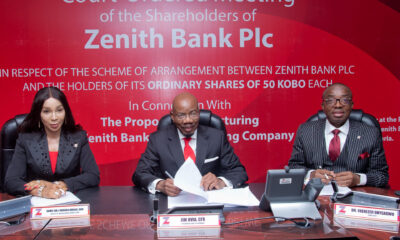In a notable milestone for the Nigerian stock market, Zenith Bank has made its way into the elite group of stocks worth over one trillion naira, known as SWOOTs (Stocks Worth Over One Trillion).
This significant accomplishment follows the bank’s recent crossing of the one trillion naira mark in market capitalization, cementing its standing among other prominent stocks.
Zenith Bank’s share price experienced a notable appreciation of 3.23% from the previous week to close N32 per share to propel the bank’s market capitalization above one trillion naira to N1.004 trillion.
The bank’s impressive performance has been underlined by a 48% increase in its share value over the past year, making it one of the top performers on the banking index.
It is worth noting that Zenith Bank is the only financial institution currently included in the prestigious group of SWOOTs, further highlighting its strength and significance within the market.
The combined market capitalization of the SWOOTs now stands at N21.560 trillion, reflecting a notable increase from the previous week’s value of N20.617 trillion.
These SWOOTs, including Airtel Africa, MTN Nigeria, Dangote Cement, BUA Foods, BUA Cement, and Zenith Bank, collectively account for 66.7% of the NGX (Nigerian Exchange) Equity market capitalization.
A closer look at the performance of each individual SWOOT reveals interesting insights.
BUA Foods Plc, for instance, maintained a stable share price of N135.75 per share, with a corresponding market capitalization of N2.44 trillion. Notably, the company reported impressive growth in its unaudited financial statement for Q1 2023, with revenue surging by 60.2% to N144.32 billion.
Also, its Profit After Tax rose by an impressive 77.1% to N40.47 billion during the same period, while Earnings Per Share (EPS) experienced a remarkable increase of 77% compared to Q1 2022.
BUA Cement Plc share price rose by 4.65% from the previous week to close at N90 per share as the market capitalization of the company expanded to N3.05 trillion. However, the company’s unaudited financial report for Q1 2023 revealed a decline in profit after tax by -19.1% to N26.80 billion.
Dangote Cement Plc, the most capitalized cement producer on the NGX, experienced a moderate gain in share price, closing at N287.5 per share after a 1.23% increase from the previous week. With a total market capitalization of N4.90 trillion, the company’s unaudited Q1 2023 financial results reported a marginal loss in revenue.
On a positive note, Dangote Cement Plc’s Profit After Tax marginally increased by N3.65 billion (1.56%) to N109.50 billion in Q1 2023 compared to the same period in 2022.
Airtel Africa Plc, on the other hand, encountered a slight setback with a -1.72% loss in share price, closing at N1266.8 per share. Consequently, the company’s market capitalization decreased by N83.43 billion, closing at N4.76 trillion.
However, Airtel Africa reported positive financial results in its audited financial report, with service revenue amounting to N980 billion ($2.128 billion) for the financial year ending March 31, 2023. This represents a growth of 20.3% compared to the previous year.
MTN Nigeria Plc experienced a depreciation of -3.10% in its share price, closing at N265.50 per share. As the most valued company on the NGX, MTN’s market capitalization declined to N5.404 trillion, losing N173.01 billion from the previous week.
Nevertheless, MTN reported a 20.6% growth in revenue, amounting to N568.14 billion, and a 4.6% increase in Profit After Tax to N101.30 billion in its unaudited financial report for Q1 2023.


 Forex3 weeks ago
Forex3 weeks ago
 Naira3 weeks ago
Naira3 weeks ago
 Billionaire Watch3 weeks ago
Billionaire Watch3 weeks ago



 Naira3 weeks ago
Naira3 weeks ago






 Naira3 weeks ago
Naira3 weeks ago




 Naira2 weeks ago
Naira2 weeks ago






 Naira2 weeks ago
Naira2 weeks ago




 Naira4 weeks ago
Naira4 weeks ago





















